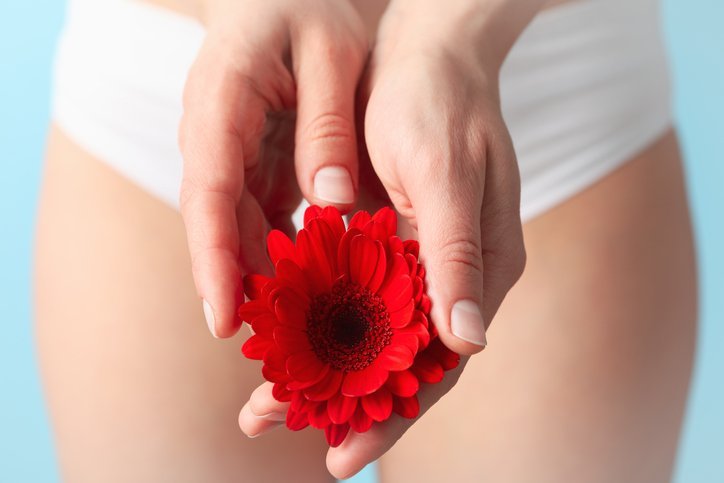[ad_1]
If you’re a vagina owner, you probably know the sheer importance of keeping it clean, well-cared for and happy. This strong muscular tube that’s the holy grail of the female reproductive system serves as the passageway for a myriad of super-important functions, like menstruation, sexual intercourse and, of course, childbirth. Needless to say, keeping it content is vital, not only to its overall health and wellness, but your ability to be comfortable and carry out your day-to-day responsibilities.
Many people tend to refer to the vagina as the external, visible part of the female genitals, however, this is technically termed the vulva. It’s only the inside—the thick and elastic muscle walls—that are biologically referred to as the vagina. “The muscular wall is composed of two layers of muscle fibers, a weak internal circular layer and a strong external longitudinal layer,” explains Canada-based naturopathic doctor and birth doula Sarah Connors, N.D.. “Covering the muscle tissue is a sheath of connective tissue that consists of blood vessels, lymphatic ducts and nerve fibers, which joins those tissues of the urinary bladder, rectum and other pelvic structures.”
One of the most fascinating features of the vagina is its self-cleaning ability. In other words, it cleans itself—there is no need to “clean” the vagina using special soaps, douche, or any other “cleaning” tools or techniques, explains Dr. Connors. Even the American College of Obstetricians and Gynecologists (ACOG) attests to the fact that the vagina cleans itself and keeps itself healthy by maintaining the correct pH balance and cleaning itself with natural secretions.
How does your vagina do this? By utilizing the “good” bacteria contained within it. “These bacteria maintain the ideal pH balance in your vagina, which is slightly acidic and the cells in the lining contain large quantities of glycogen (stored animal starch),” says Dr. Connors. “Bacteria within the vagina ferment the glycogen, so that lactic acid is produced, which makes the surface of the lining slightly acidic, thus protecting against disease-causing microorganisms that have gained entry via the vaginal canal.”
Super cool, right? But just because you don’t need soap or products to clean the vagina, practicing good vaginal self-care is still very important, especially when it comes to the external genital area known as the vulva. The tricky part is knowing how to navigate the ever-expanding market for vagina-centric products. There are a plethora of products out there claiming to “clean” the vagina or alter it’s pH to be more beneficial when, in reality, they are laden with harsh chemicals, strong fragrances and ingredients that can make you more susceptible to infection and irritation, warns Allison Rodgers, M.D., OB/GYN, reproductive endocrinologist at Fertility Centers of Illinois.
That being said, there are some products and substances that have been used for hundreds, if not thousands, of years and are still helpful today. In this article, we dive into the best products on the market for caring for your vagina and giving it the TLC it deserves.
Vaginal steaming for Vaginal Health
Also known as “yoni steaming” or “v-steaming,” this ancient practice has become more popular in recent years. This process involves preparing a large basin with hot water and a bath of herbs, such as mugwort, rosemary, lavender, calendula, chamomile, rose petals, dong quai and yarrow, and allowing them to become hot enough to produce steam, explains Dr. Connors. Next, the person sits on an open-bottom chair or stool with a blanket, robe or another suitable covering over their lower half to prevent the steam from escaping. “This practice has been used in many parts of the world and the reported benefits of the practice of using steam or smoke for the vagina include detoxification, balanced hormones, fertility, healing after childbirth,and hemorrhoid treatment to name a few,” she says. “At the moment, there isn’t much in the way of studies done to support the practice, but many have felt that it was beneficial for them.”
It’s worth pointing out that many Western healthcare practitioners are quite skeptical of any potential benefits or vaginal steaming and are much more concerned with the potential risks involved, such as burning or otherwise injuring the individual during treatment. If you are choosing to use this practice, Dr. Connors highly recommends working with someone who is well trained in this arena and knows how to prevent injury.
Probiotics For Vaginal Health
You’ve probably heard that probiotics can be incredibly beneficial for your gut health, but may be surprised to learn that it can improve the wellness of your vagina, too. Research, including one study published in the journal frontiers in Microbiology, have shown that certain strains of probiotic, specifically lactobacillus acidophilus and lactobacillus reuteri, can help maintain a health vaginal pH.
“The taking of probiotics orally can be helpful, but there are also suppository options now available that can be directly inserted into the vagina, which can be helpful especially in cases of infection since it’s a more direct route,” says Dr. Connors.
If you are new to probiotics, Dr. Connors recommends speaking with your healthcare provider about what strains may be best for you and if their use would be beneficial. “This is particularly important for the suppository probiotics as we are introducing something directly into the vaginal canal,” she adds. We suggest taking HUM’s Private Party to help achieve vaginal balance
Coconut oil for Vaginal Health
This fatty acid-rich oil that comes from the meaty part of the coconut plant is a popular Ayurvedic choice for moisturizing the vulva, according to naturopath Kiera Lane, N.M.D., MSAc, L.Ac., Dipl. Ac., director of Arizona Natural Medicine. “Applying a small amount externally can help soothe dryness and reduce friction, providing natural lubrication,” she says. “Its anti-inflammatory and antimicrobial properties make it a safe and beneficial option for supporting overall vulvar health.”
It’s a good idea to opt for virgin, cold-pressed coconut oil if you plan to use it for moisturizing or lubricating purposes of the vagina, as this variety comes with the lowest risk of irritation.
Triphala
This ancient Ayurvedic herbal formula consists of three different fruits: Indian gooseberry (Amalaki), Bibhitaki and Haritaki. When blended together, these fruits have been thought to create a synergistic effect that can aid digestion, immunity and overall well being. While there’s notably not a lot of research to back up its ability, triphala has been thought to help treat the symptoms of yeast infection and urinary tract infections and reduce the burning sensation associated with these condition.
Neem oil
Derived from the seeds of the neem tree (also known as Azadirachta indica), neem oil has been used in Ayurvedic medicine for thousands of years. It’s best known for its antimicrobial and anti-inflammatory, however, there is limited scientific evidence supporting its abilities in the vaginal health department. That being said, neem oil does contain a compound known as azadirachtin, which is thought to potentially help combat bacteria and fungi that may be associated with certain vaginal infections.
If you do intend to use neem oil, it’s important to be sure to properly dilute it since it is quite potent and can otherwise cause skin irritation. If used, it is advisable to dilute neem oil with a carrier oil before applying to the genital area. It’s also a good idea to do a small patch test on your risk to check for any adverse reactions before using it on your delicate lady bits.
Click here to get Racing Tipster Service at discounted price while it’s still available…
[ad_2]



4 Comments
Khám phá thế giới giải trí trực tuyến đỉnh cao tại MM88, nơi mang đến những trải nghiệm cá cược thể thao và casino sống động.
Đến với J88, bạn sẽ được trải nghiệm dịch vụ cá cược chuyên nghiệp cùng hàng ngàn sự kiện khuyến mãi độc quyền.
Với giao diện mượt mà và ưu đãi hấp dẫn, MM88 là lựa chọn lý tưởng cho các tín đồ giải trí trực tuyến.
Tham gia cộng đồng game thủ tại Go88 để trải nghiệm các trò chơi bài, poker phổ biến nhất hiện nay.